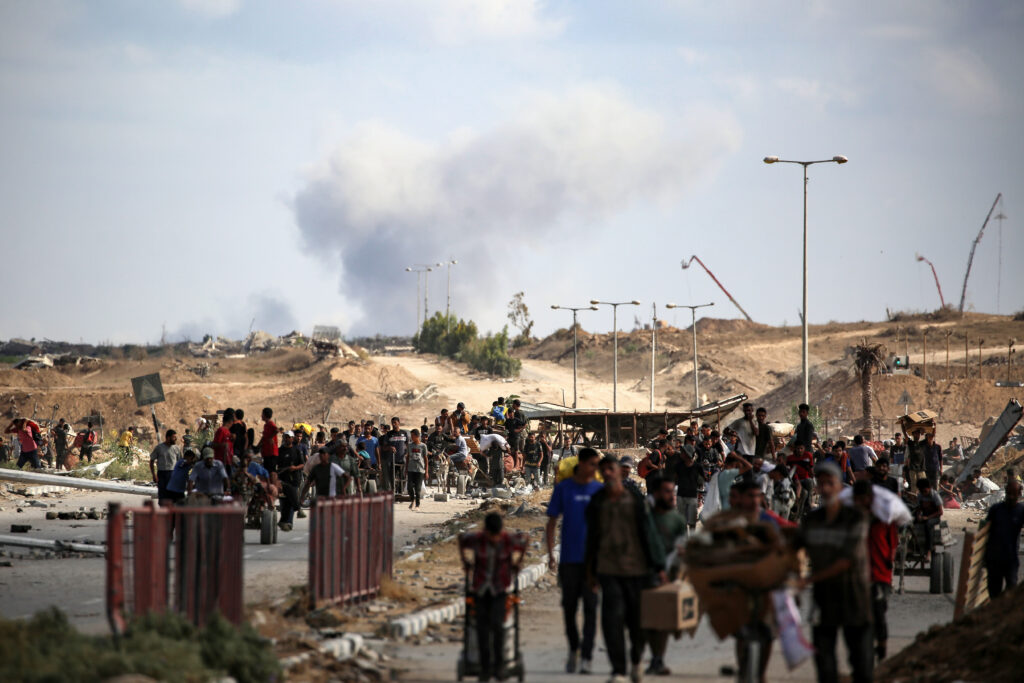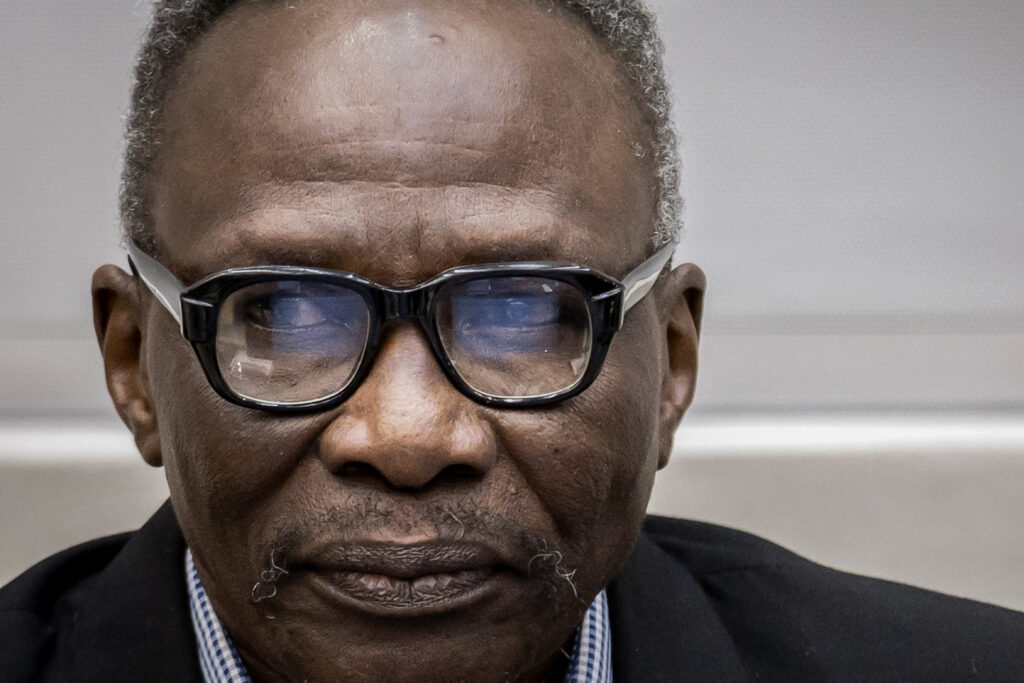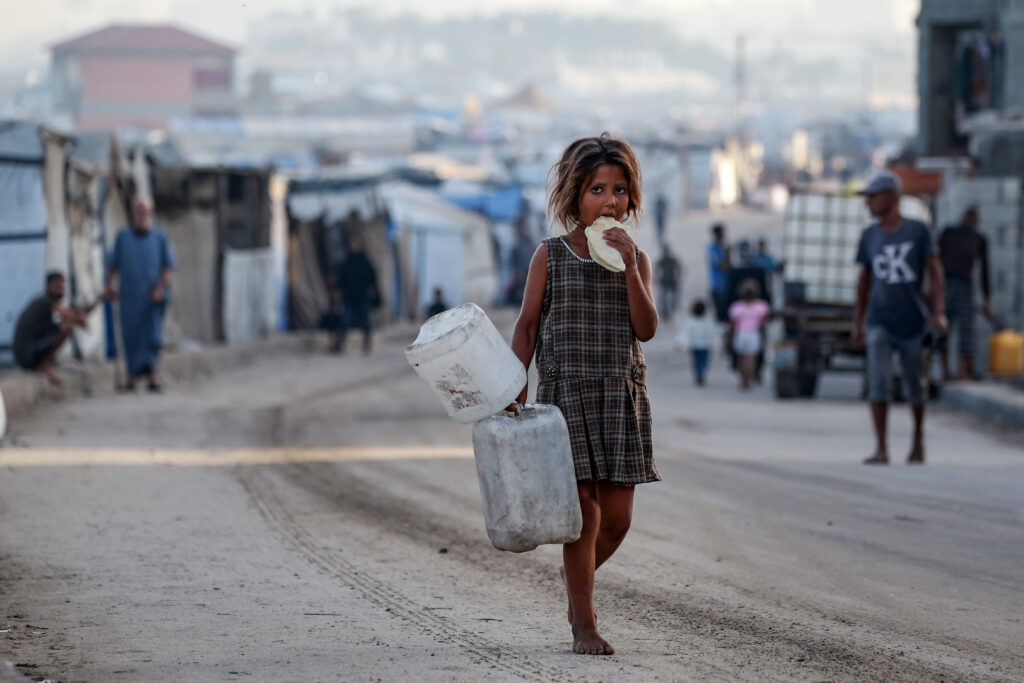AFP Asia Business
Israel, Hamas due to start ceasefire talks in Egypt
Delegations from Hamas, Israel and the United States are due to convene in Egypt for talks on Monday, with President Donald Trump urging negotiators to “move fast” to end the nearly two-year war in Gaza.Both Hamas and Israel have responded positively to Trump’s proposal for an end to the fighting and the release of captives in Gaza in exchange for Palestinians held in Israeli jails.Hamas’s lead negotiator Khalil al-Hayya was to meet with mediators from Egypt and Qatar in Cairo Monday morning, a senior official from the Palestinian militant group told AFP, ahead of talks in the Egyptian resort town of Sharm El-Sheikh.Negotiations will look to “determine the date of a temporary truce”, the official said, as well as create conditions for a first phase of the peace plan, in which 47 hostages held in Gaza are to be released in return for hundreds of Palestinian detainees.Posting on his Truth Social platform on Sunday, the US president praised “positive discussions with Hamas” and allies around the world including Arab and Muslim nations.”I am told that the first phase should be completed this week, and I am asking everyone to MOVE FAST,” Trump wrote.Foreign ministers from several countries, including Egypt, said the talks were a “real opportunity” to achieve a sustainable ceasefire, while Israeli Prime Minister Benjamin Netanyahu expressed hope that the hostages could be released within days.- ‘Strikes will have to stop’ -US Secretary of State Marco Rubio on Sunday urged Israel to stop bombing Gaza ahead of the discussions in Egypt.”You can’t release hostages in the middle of strikes, so the strikes will have to stop,” Rubio told CBS.Netanyahu said the Israeli delegation would be departing for Egypt on Monday for the talks, due to start on the eve of the second anniversary of the October 7, 2023 Hamas attack that sparked the war.The White House said Trump had also sent two envoys to Egypt — his son-in-law Jared Kushner and Middle East negotiator Steve Witkoff.”During communications with mediators, Hamas insisted that it is essential for Israel to halt military operations across all areas of the Gaza Strip, cease all air, reconnaissance, and drone activity, and withdraw from inside Gaza City,” a Palestinian source close to Hamas said, adding the group would “also halt their military operations” in parallel.Militants seized 251 hostages during their October 7, 2023 attack, 47 of whom are still in Gaza. Of those, the Israeli military says 25 are dead.According to Trump’s plan, in return for the hostages, Israel is expected to release 250 Palestinian prisoners with life sentences and more than 1,700 detainees from the Gaza Strip who were arrested during the war.Noting that the “operational situation has changed”, Israeli military chief Lieutenant General Eyal Zamir warned Sunday that if the negotiations failed, the military would “return to fighting” in Gaza.Israel, meanwhile, has continued to carry out strikes.AFPTV footage showed thick smoke billowing over the skyline of the coastal territory on Sunday.- No role for Hamas -Gaza’s civil defence agency, a rescue force operating under Hamas authority, said Israeli attacks killed at least 20 people across the territory on Sunday, 13 of them in Gaza City. On Sunday night and Monday morning, airstrikes were conducted in Khan Yunis and parts of Gaza City, while artillery shelling and gunfire from drones continued in areas east of Gaza City, the civil defence told AFP.”There has been a noticeable decrease in the number of air strikes (since last night). The tanks and military vehicles have slightly pulled back,” said Muin Abu Rajab, 40, a resident of the city’s Al-Rimal neighbourhood.Hamas has insisted it should have a say in the territory’s future, though Trump’s roadmap stipulates that it and other factions “not have any role in the governance of Gaza”.The US plan, endorsed by Netanyahu, calls for a halt to hostilities, the release of hostages within 72 hours, a gradual Israeli withdrawal from Gaza and Hamas’s disarmament — something the group has described as a red line in the past.Under the proposal, administration of the territory would be taken up by a technocratic body overseen by a post-war transitional authority headed by Trump himself.”We hope Trump will pressure Netanyahu and force him to stop the war,” said Ahmad Barbakh, a resident of the Al-Mawasi area.”We want the prisoner exchange deal to be completed quickly so that Israel has no excuse to continue the war.”Hamas’s October 2023 attack resulted in the deaths of 1,219 people, mostly civilians, according to an AFP tally of Israeli official figures.Israel’s retaliatory offensive has killed at least 67,139 Palestinians, according to health ministry figures in the Hamas-run territory that the United Nations considers reliable.burs-jd/sbk/sla/csp/ser
China’s chip challenge: the race to match US tech
China’s push to develop top-end artificial intelligence microchips is gaining momentum, but analysts say it will struggle to match the technical might of US powerhouse Nvidia within the current decade.Ramping up its chip industry is a way for Beijing to beat restrictions imposed by Washington on exports of the most advanced chips — used to …
China’s chip challenge: the race to match US tech Read More »
ICC to give war crimes verdict on Sudan militia chief
The International Criminal Court (ICC) on Monday hands down its verdict on a feared Sudanese militia chief accused of war crimes and crimes against humanity during brutal attacks in Darfur.Ali Muhammad Ali Abd-Al-Rahman, also known by the nom de guerre Ali Kushayb, faces 31 counts of crimes including rape, murder and torture allegedly carried out in Darfur between August 2003 and at least April 2004.Prosecutors say he was a leading member of Sudan’s infamous Janjaweed militia, who participated “enthusiastically” in multiple war crimes.But Abd-Al-Rahman, who was born around 1949, has denied all the charges, telling the court they have got the wrong man.”I am not Ali Kushayb. I do not know this person… I have nothing to do with the accusations against me,” he told the court at a hearing in December 2024.Abd-Al-Rahman fled to the Central African Republic in February 2020 when a new Sudanese government announced its intention to cooperate with the ICC’s investigation.He said he then handed himself in because he was “desperate” and feared authorities would kill him.”I had been waiting for two months in hiding, moving around all the time, and I was warned that the government wanted to arrest me, and I was afraid of being arrested,” he said.”If I hadn’t said this, the court wouldn’t have received me, and I would be dead now,” added the suspect.Fighting broke out in Sudan’s Darfur region when non-Arab tribes, complaining of systematic discrimination, took up arms against the Arab-dominated government.Khartoum responded by unleashing the Janjaweed, a force drawn from among the region’s nomadic tribes.The United Nations says 300,000 people were killed and 2.5 million displaced in the Darfur conflict in the 2000s.- ‘Severe pain’ -During the trial, the ICC chief prosecutor said Abd-Al-Rahman and his forces “rampaged across different parts of Darfur”.He “inflicted severe pain and suffering on women, children and men in the villages that he left in his wake”, said Karim Khan, who has since stepped down as he faces allegations of sexual misconduct.Abd-Al-Rahman is also thought to be an ally of deposed Sudanese leader Omar al-Bashir, who is wanted by the ICC on genocide charges.Bashir, who ruled Sudan with an iron fist for nearly three decades, was ousted and detained in April 2019 following months of protests in Sudan.He has not, however, been handed over to the ICC, based in The Hague, where he also faces multiple charges of war crimes and crimes against humanity.ICC prosecutors are hoping to issue fresh arrest warrants related to the current crisis in Sudan.Tens of thousands have been killed and millions displaced in a war between Sudan’s army and the paramilitary Rapid Support Forces (RSF), which grew out of the Janjaweed militia.The conflict, marked by claims of atrocities on all sides, has left the northeast African country on the brink of famine, according to aid agencies.Local leaders in the Kalma camp in South Darfur are renting a Starlink satellite internet connection on Monday to let survivors watch the verdict.The area is under RSF control, and the camp is facing a cholera outbreak and a severe hunger crisis.
Negotiators due in Egypt for Gaza talks as Trump urges quick action
Delegations from Hamas, Israel and the United States are due to convene in Egypt for talks on Monday, with US President Donald Trump calling on negotiators to “move fast” to end the nearly two-year war in the Gaza Strip.The envoys are set to meet in the Egyptian resort town of Sharm El-Sheikh, on the eve of the second anniversary of the October 7, 2023 Hamas attack that sparked the war.Both Hamas and Israel have responded positively to Trump’s roadmap to end the fighting and release captives in Gaza in exchange for Palestinians held in Israeli jails, though the details still need to be ironed out.A senior Hamas official told AFP that the group was “very keen to reach an agreement to end the war and immediately begin the prisoner exchange process in accordance with the field conditions”.Israeli Prime Minister Benjamin Netanyahu, meanwhile, said he hoped the hostages could be released within days.Trump wrote on his Truth Social platform on Sunday that “there have been very positive discussions with Hamas” and other parties over freeing the captives and ending the war.The talks were “proceeding rapidly”, he said, adding that “the first phase should be completed this week, and I am asking everyone to MOVE FAST”.Trump has sent two emissaries to help finalise the deal: his special envoy Steve Witkoff, and his son-in-law Jared Kushner.Hamas’s chief negotiator, Khalil al-Hayya, arrived in Egypt late on Sunday at the head of the delegation, the group said in a statement.The Israeli delegation will depart for Egypt on Monday, according to Netanyahu.After months of stalled mediation efforts by the United States, Egypt and Qatar aimed at ending the devastating war, foreign ministers from several countries expressed optimism at the latest diplomatic push in a joint statement, calling the negotiations a “real opportunity” to achieve a sustainable ceasefire.On Sunday, US Secretary of State Marco Rubio urged Israel to stop bombing Gaza ahead of the discussions, saying “you can’t release hostages in the middle of strikes”.Israel’s continued attacks on Sunday killed at least 20 people across the Palestinian territory, according to Gaza’s civil defence agency.Cairo has said the new talks will aim to lay “the ground conditions and details of the exchange of all Israeli detainees and Palestinian prisoners”.- Hostage-prisoner exchange -Hamas fighters are ready to “halt their military operations” once Israel halts theirs, according to a Palestinian source close to the group.Trump has said that once the hostage-prisoner exchange is complete, “we will create the conditions for the next phase of withdrawal”.In addition to a halt to hostilities, the US plan calls for the release of hostages, both living and dead, within 72 hours.Palestinian militants seized 251 hostages during their October 7 attack, 47 of whom are still in Gaza. Of those, the Israeli military says 25 are dead.In return for the hostages, Israel is expected to release 250 Palestinian prisoners with life sentences and more than 1,700 detainees from the Gaza Strip who were arrested during the war.The next step of the plan would be a gradual Israeli withdrawal from Gaza and Hamas’s disarmament — something the group has frequently described as a red line in the past.Hamas has insisted it should have a say in the territory’s future, though Trump’s plan stipulates that it and other factions “not have any role in the governance of Gaza”.Under the proposal, administration of the territory would be taken up by a technocratic body overseen by a post-war transitional authority headed by Trump himself and including former UK Prime Minister Tony Blair.burs-bha/smw/mjw




